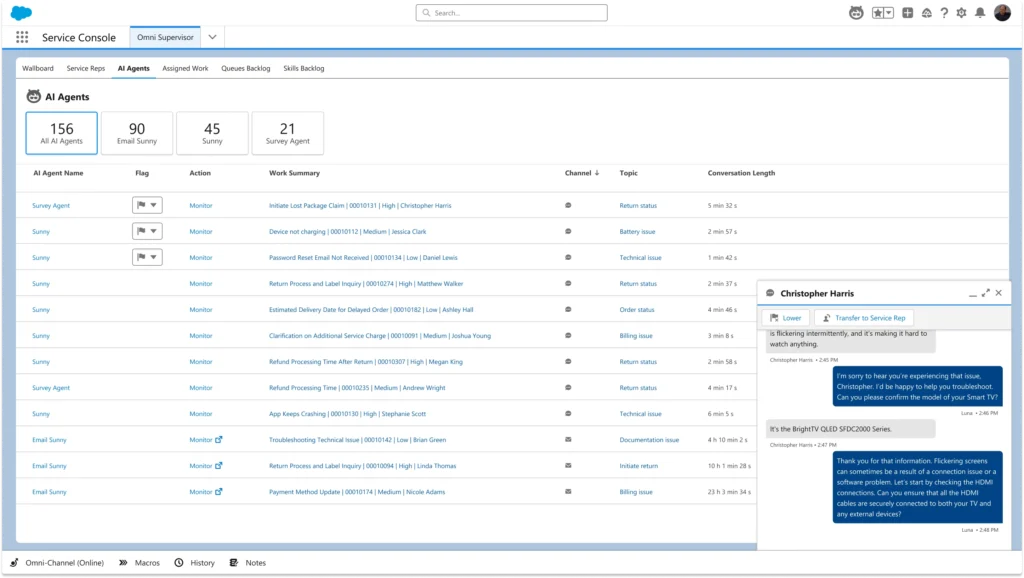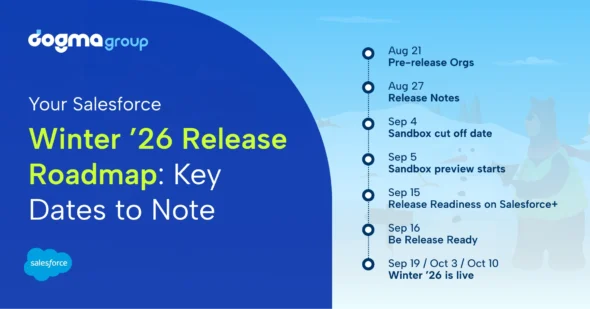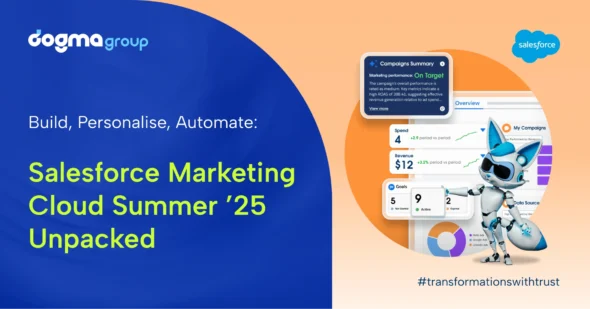Every support interaction presents a challenge: tickets pile up, SLAs loom, and agents struggle to keep up with scattered information. Customers today expect fast, consistent support—and your agents need the right tools to deliver it. With the Summer ‘25 release, Salesforce Service Cloud confronts these pain points with advanced enhancements.
Let’s explore how these updates give your front-line teams the “Service Edge” they need to resolve issues faster and delight customers.
1. AI-Driven Case Guidance with Agentforce Service Assistant
Front-line agents often spend precious minutes piecing together customer histories, knowledge articles, and related cases before even drafting a response. With Agentforce Service Assistant, Summer ’25 eliminates this overhead. The Assistant analyses your org’s data in real time, surfaces a concise case summary, and recommends the exact next steps. Whether it be updating a field, suggesting a knowledge article, or triggering an approval. This targeted guidance not only cuts average resolution times by up to 30% but also ensures newer team members deliver the same high-quality support as seasoned reps, boosting overall consistency and reducing training costs.
2. Realistic SLA Tracking via Business-Hours Case Aging
Traditional case-age metrics that count nights and weekends can mislead managers into treating low-priority tickets as urgent. The new Business Hours Age field precisely calculates how long a case sat open during your defined support hours. As a result, supervisors gain an accurate, context-aware view of ticket aging. This enables them to reprioritise genuinely time-sensitive issues and avoid the wasted effort of chasing “overdue” alerts that fall outside service windows. Agents, in turn, focus on customers whose cases truly need immediate attention, improving SLA compliance without adding administrative burden.
3. One-Click Case Closure Saves Over One Hour Per Week (Delivered Idea)
Closing a resolved case once meant navigating multiple screens and clicks—time agents could ill afford. Summer ’25 introduces a single, prominent Close Case button on the case details page, collapsing a multi-step process into one intuitive action. This seemingly small change translates into significant time savings—agents reclaim over an hour each week—allowing them to spend more time on complex problem-solving, proactive outreach, or simply taking a breather between tickets.
4. Reliable Email-to-Case and Branded AI Summaries
Nothing frustrates customers more than their emails vanishing into a black hole. With the new Notify Senders About Email-to-Case Processing Errors toggle, any failed conversion—due to formatting or routing rules—triggers an automatic “please resend” alert back to the customer, closing the communication loop and preserving trust. Meanwhile, agents leverage Prompt Builder (Release Notes: “Tailor the Email Summaries Prompt…”) to craft Einstein Email Summaries that perfectly match their brand’s tone and length requirements. This dual enhancement eradicates silent failures and slashes the time spent editing AI-drafted replies in half, resulting in quicker, on-brand email responses.
5. Engaging Surveys with Emojis, Progress Bars & Attachments
Static surveys often see high abandonment. Summer ’25 remedies this with dynamic emoji ratings, a visual progress indicator, and support for up to 20 file attachments per response. Agents integrate these surveys directly into the service process—customers tap expressive emojis instead of typing long scores, watch their progress bar fill, and even upload screenshots of issues. The result: response rates climb, feedback depth increases, and agents receive actionable insights—complete with real-world context—to refine resolutions swiftly.
6. Proactive Coaching via Live Email Monitoring
Supervisors used to review email performance only after cases closed, too late to prevent errors. Now, Omni Supervisor surfaces live email threads in its AI Agents tab, bringing email monitoring to real-time alongside chat oversight. Coaches spot tone missteps, SLA risks, or knowledge gaps mid-conversation and immediately guide agents. This proactive intervention elevates service quality on the spot, prevents escalations, and accelerates new-hire ramp time through hands-on mentoring during actual customer interactions.

7. Collaborative Troubleshooting through Multi-Rep Messaging
Complex cases often stall when agents need input from multiple experts. With the Multi-Rep Messaging Conferencing feature, agents now invite up to five colleagues into a single messaging session (two on specific third-party channels). Whether it’s a billing intricacy or a technical deep-dive, this real-time collaboration removes hand-off delays and context loss, delivering accurate answers in one seamless chat. Customers experience fewer transfers and faster resolutions, while your team shares knowledge more organically.
8. Seamless Voice Routing & Voicemail Reliability
Voice remains a critical channel, but traditional IVRs and lost voicemails can frustrate callers. Summer ’25 assigns unique direct-inward-dial (DID) numbers to agents, ensuring customers reach their trusted rep on the first try. Combined with status-based capacity for Voice in standard apps, agents handle multiple calls without session conflicts. Finally, revamped voicemail flows guarantee every message is correctly tagged and delivered. The net effect is higher answer rates, fewer dropped calls, and stronger customer loyalty.
Conclusion
Service Cloud Summer ’25 zeroes in on agent pain points—searching for context, chasing false SLAs, lost tickets, and siloed collaboration—and obliterates them with targeted updates. By delivering AI-driven guidance, realistic aging metrics, seamless email and voice tools, and collaborative messaging, Salesforce empowers your agents to resolve issues faster, more consistently, and with greater confidence.






